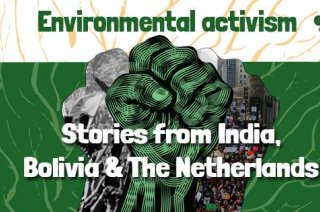
Event
Environmental activism: Stories from India, Bolivia & The NL
In this lecture we will focus on environmental activism worldwide. OtherWise has invited three speakers who will tell you first person memoirs of their experiences with doing activism or documenting it. Stories are told about Bolivia, India and The Netherlands with a lot of room for questions and interaction.
The first two speakers are part of Code Rood: Talissa Soto and Chihiro Geuzebroek. Code Rood is a Dutch direct action group that fights against the fossil fuel industry. Next to being active in Code Rood, Chihiro Geuzebroek made a documentary about environmental activism and human rights in Bolivia, called "Radical Friends". The third speaker is Esha Shah, assistant professor at the Water Resources Management group of the WUR. Esha Shah does research on two major political movements in India: the Maoist movement and anti-large dam movement. All speakers focus on the intersection of environmentalism and inequality issues.
The doors open at 19.30 so you can enjoy a drink before the event starts. We hope to have an inspiring evening together.
This lecture is part of an lecture series on activism organised by OtherWise. Below you can find an introduction to this series:
During the mass protest just before the COP23 in Bonn last November, the most powerful demand was "power to the people". This environmental movement has a strong emphasis that it is time for people to be heard and challenges world power relations. But not only environmental destruction is rampaging the world, racism, sexism and xenophobia are reasons for the people to claim the streets and question existing structures. Much of the opposition against these depletions, prejudices and forms of discrimination come from local, national and international activist groups, such as feminist, migrant, and decolonization movements, that challenge today's social and political structures which are shaping our world.
In specific, the goal of this lecture series is to ‘move’ students and make them familiar to the visible (activist) organisations today, particularly in feminism, environmentalism and post-colonialism. By doing this science and activism come close together by both supporting the education of academic schooled activists as well as by raising awareness. Next to this, we hope to support certain skills that are useful for a more activist attitude in- and outside of the academic world.
